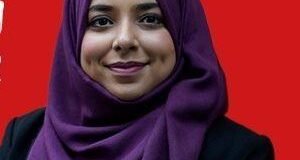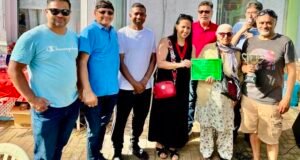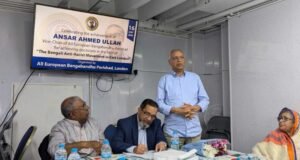 Bishshow Shahitto Kendro (BSK) has marked this year’s International Women’s Day in partnership with Idea Store by paying homage to a Bengali woman, Anwara Bahar
Bishshow Shahitto Kendro (BSK) has marked this year’s International Women’s Day in partnership with Idea Store by paying homage to a Bengali woman, Anwara Bahar
Choudhury (1919-1987) for her exemplary contribution in the educational,cultural and social emancipation of the Bengali speaking women of the then British Bengal (which included
West Bengal and today’s Bangladesh) .To celebrate the occasion,BSK presented a documentary film on her life. Many eminent academics, writers, dance and music artists and social activists have shared their views and personal experiences on her struggles, aspirations and achievements.The programme was coordinated by Khadija Rahman, the Secretary of BSK at Whitechapel’s Idea Store. The documentary was conceptualised, narrated and produced by Iqbal Bahar Choudhury (Former Head of the Bengali Service, Voice of America).SAMIR KUSHARI directed the film and did the videography. Shaheen Choudhury Westcombe MBE (daughter of Anwara Bahar Choudhury) and Dr. Halima Begam Alam who first met Anwara Bahar Choudhury during her student days spoke at the event. The film was followed by an interactive discussion in which the audience participated.Anwara Bahar Choudhury was the wife of Habibullah Bahar Choudhury who was a legendary figure in the political, social, sports and literary arena of Undivided Bengal.Following the partition of India the family moved to Dhaka where he was the Health Minister in the first cabinet. She was engaged in various literary pursuits from her student days. A number of her articles and books were published. Notable among her books are Chabi Dekhi Chara Shikhi, Kichir Michir, Harek Rakam, Amar Chetonar Rang etc. Her school education started at a primary municipal school in Dhaka where she received a scholarship. Later, she moved to Kolkata with her aunt, writer M Fatema Khanam where she studied at Sakhawat Memorial Girls’ High School of Rokeya. She was the first Bengali muslim student there. Anwara Bahar Choudhury was a meritorious student. After Matriculation she joined Bethune College from where she graduated in 1938. Following this she completed her Bachelor of Training (BT) at Scottish Church College, Kolkata. Very few women at the time had the opportunity to study as purdah prevailed. She aspired to become a teacher and started her career at Sakhawat Memorial Girls’ High School. She was the Head teacher of the school until the partition of India. Whilst in Kolkata she had spent a brief period teaching at Lady Brabourne College. Following independence and the formation of a new country in 1947 ( now Bangladesh, then East Pakistan, ) she joined Vidyamoyee Government Girls’ High School, Mymensingh. She was later transferred to Dhaka where she worked as the Head of Kamrunessa and later Bangla Bazar Government Girls’ High School. For sometime she was based at the Education Directorate as Special Officer, Women’s Education. She believed that there should be education facilities for all women and there was an urgent need to focus on the rural areas.Around 1950/51 she established a dance and music school, Surobitan in Dhaka. The classes were held on weekends at
Kamrunnessa School. She was one of the founders of Bulbul Academy of Fine Arts (BAFA , also known as Bulbul Lalitkala Academy )in 1955 in Dhaka.Her interest in cultural activities
took her far and wide. She was the Deputy Leader of government cultural delegations to Iran Iran & Iraq in 1961 and
Soviet Union 1963. .Anwara Bahar Choudhury was a life member of Bangla Academy. Following the death of her husband ,she established Habibullah Bahar College Dhaka in 1969 in his memory.She
was its Founder Member and Managing Director. Throughout her life she worked for the cause of women and their
empowerment. In Kolkata she was the secretary of Anjumane-Khawatin-e Islam and then the Co-Chair of APWA.during the
1950s. The disadvantaged people of the community were always close to her heart and until her last days she worked to
enhance their quality of life. .
 Weekly Bangla Mirror | Bangla Mirror, Bangladeshi news in UK, bangla mirror news
Weekly Bangla Mirror | Bangla Mirror, Bangladeshi news in UK, bangla mirror news






